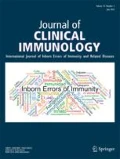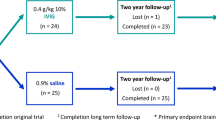Abstract
The human polyclonal IgG antibody preparation known as Intravenous Immunoglobulin (IVIG) has been under study as a potential treatment for Alzheimer’s disease (AD) since 2002. Preclinical and clinical studies have shown that IVIG has anti-amyloid and immune modulatory properties relevant to treating neurodegenerative disorders. In early stage AD clinical trials, IVIG was found to reduce cognitive decline and increase brain glucose metabolism. Unfortunately, IVIG failed to meet primary outcome objectives in the North American Phase 3 clinical trial in mild to moderate AD. However, positive cognitive signals were observed in pre-planned subgroup analyses among APOE-ε4 carriers and moderately impaired AD patients. Biomarker studies revealed dose dependent increases in plasma and CSF immunoglobulins and decreases in beta amyloid-42 levels. In addition, IVIG treatment was generally safe and well-tolerated. These findings suggest that naturally occurring human anti-amyloid antibodies may play a physiologic role in the clearance of aggregated amyloid proteins. While the results of clinical trials to date do not provide support for the use of IVIG to treat AD at the doses tested, additional studies of IVIG’s mechanisms are warranted and may guide the development of more effective therapies for AD in the future.

Similar content being viewed by others
References
Hardy J, Allsop D. Amyloid deposition as the central event in the aetiology of Alzheimer’s disease. Trends Pharmacol Sci. 1991;12(10):383–8.
Schenk D et al. Immunization with amyloid-beta attenuates Alzheimer- disease-like pathology in the PDAPP mouse. Nature. 1999;400:173–7.
Rinne JO, Brooks DJ, Rossor MN, et al. 11C-PiB PET assessment of change in fibrillar amyloid-beta load in patients with Alzheimer’s disease treated with bapineuzumab: a phase 2, double-blind, placebo-controlled, ascending-dose study. Lancet Neurol. 2010;9(4):363–72.
Salloway S, Sperling R, Fox NC, et al. Two phase 3 trials of bapineuzumab in mild-to-moderate Alzheimer’s disease. N Engl J Med. 2014;370(4):322–33.
Doody RS, Thomas RG, Farlow M, et al. Phase 3 trials of solanezumab for mild-to-moderate Alzheimer’s disease. N Engl J Med. 2014;370(4):311–21.
Kaveri SV. Intravenous immunoglobulin: exploiting the potential of natural antibodies. Autoimmun Rev. 2012;11(11):792–4.
Gaskin F, Finley J, Fang Q, et al. Human antibodies reactive with beta-amyloid protein in Alzheimer’s disease. J Exp Med. 1993;177:1181–6.
Du Y, Dodel R, Hampel H, Buerger K, Lin S, Eastwood B, et al. Reduced levels of amyloid beta-peptide antibody in Alzheimer disease. Neurology. 2001;57:801–5.
Weksler ME, Relkin N, Turkenich R, et al. Patients with Alzheimer disease have lower levels of serum anti-amyloid peptide antibodies than healthy elderly individuals. Exp Gerontol. 2002;37:943–8.
Hyman BT, Smith C, Buldyrev I, et al. Autoantibodies to amyloid-beta and Alzheimer’s disease. Ann Neurol. 2001;49:808–10.
Dodel R, Hampel H, Depboylu C, et al. Human antibodies against amyloid beta peptide: a potential treatment for Alzheimer’s disease. Ann Neurol. 2002;52:253–6.
Szabo P, Mujalli DM, Rotondi ML, et al. Measurement of anti-beta amyloid antibodies in human blood. J Neuroimmunol. 2010;227:167–74.
O’Nuallain B, Williams AD, McWilliams-Koeppen HP, et al. Anti-amyloidogenic activity of IgGs contained in normal plasma. J Clin Immunol. 2010;30 Suppl 1:S37–42.
Ferreira ST, Klein WL. The Aβ oligomer hypothesis for synapse failure and memory loss in Alzheimer’s disease. Neurobiol Learn Mem. 2011;96(4):529–43.
Enciu A, Popescu BO. Is there a causal link between inflammation and dementia? Biomed Res Int. 2013:ID: 316495. 1–6.
Relkin NR, Szabo P, Adamiak B, Burgut T, Monthe C, Lent RW, et al. 18-Month study of intravenous immunoglobulin for treatment of mild Alzheimer disease. Neurobiol Aging. 2009;30:1728–36.
Puli L, Pomeshchik Y, Olas K, et al. Effects of human intravenous immunoglobulin on amyloid pathology and neuroinflammation in a mouse model of Alzheimer’s disease. J Neuroinflammation. 2012;9:105.
Dodel RC, Du Y, Depboylu C, et al. Intravenous immunoglobulins containing antibodies against beta-amyloid for the treatment of Alzheimer’s disease. J Neurol Neurosurg Psychiatry. 2004;75:1472–4.
Tsakanikas D, Relkin N. Neuropsychological outcomes following 18-months of uninterrupted intravenous immunoglobulin (IGIV) treatment in patients with Alzheimer’s disease. Toronto: American Academy of Neurology; 2010.
Devi G, Schultz S, Khosrowshahi L, et al. A retrospective chart review of the tolerability and efficacy of intravenous immunoglobulin in the treatment of Alzheimer’s disease. J Am Geriatr Soc. 2008;56:772–4.
Dodel R, Rominger A, Bartenstein P, et al. Intravenous immunoglobulin for treatment of mild-to-moderate Alzheimer’s disease: a phase 2, randomised, double-blind, placebo-controlled, dose-finding trial. Lancet Neurol. 2013;12:233–43.
Relkin N, on behalf of the GAP Sttudy Group. Results of GAP (160701): a phase III study of intravenous gammaglobulin for the treatment of mild to moderate Alzheimer’s disease. Presented at AAIC, Boston 2013.
Fillit H, Hess G, Hill J, et al. IV immunoglobulin is associated with a reduced risk of Alzheimer disease and related disorders. Neurology. 2009;73(3):180–5.
Acknowledgments
The author acknowledges the support of the National Institute on Aging through a grant to the Alzheimer’s disease Cooperative Study Group and Baxter for its support of all phases of the US studies of IVIG for Alzheimer’s.
Author information
Authors and Affiliations
Corresponding author
Rights and permissions
About this article
Cite this article
Relkin, N. Clinical Trials of Intravenous Immunoglobulin for Alzheimer’s Disease. J Clin Immunol 34 (Suppl 1), 74–79 (2014). https://doi.org/10.1007/s10875-014-0041-4
Received:
Accepted:
Published:
Issue Date:
DOI: https://doi.org/10.1007/s10875-014-0041-4



